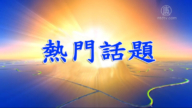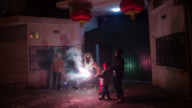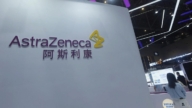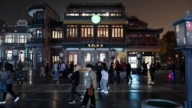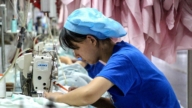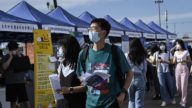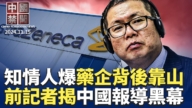【新唐人2014年03月27日讯】台湾“反服贸学运”还在延烧,总统马英九再次同意学生们提出的对话要求。连日来,海峡对岸的中共官方媒体,也发表大量文章报导台湾学运,隔空参战。近在咫尺的台湾学运,对北京当局来说,恐怕也无法掉以轻心。
台湾的中华民国总统马英九26号再次表示,愿意邀请“反服贸”学生代表到总统府对话,并且同意学生的要求,在公开透明的场合见面,并全程开放,让媒体采访。
从18号开始,台湾学生发起“反服贸”抗议后,大陆媒体的报导耐人寻味。这些报导有的评价台湾学生恐惧开放,缺少雄心和勇气﹔有的说台湾民进党是学运的幕后指使者,还有媒体公然引用中共前领导人的说法,要用经济合作“买”下台湾。
原《中国》杂志社记者刘逸明:“大陆的媒体在做新闻报导的时候,往往首先考虑的是是否在政治上正确,报导要符合中共当局的口味。台湾的反服贸,中共官方肯定是非常害怕的。因为反服贸的核心就是反对台湾什么都依赖大陆,这个时候中共就完全可以控制台湾。”
台湾“反服贸”学生抗议马英九政府以“黑箱作业”方式,同北京当局签署这项协议。但25号,中共官媒《央视》国际台采访了台湾争议人物,前立委邱毅。他说,学生占领的立法院讲台上的太阳花,是香蕉,并振振有词的确认说,那些“香蕉”是民进党人送给学生的,是民进党指使学生发起这场运动,邱毅的说词现在已招来一片嘲讽。
中国民主党成员周志荣:“ 中国政府的媒体他们报导所有的国际事件,首先的出发点是要维护他们的独裁政权。如果他们在报导的时候有可能引发多米诺骨牌效应,导致他们独裁政权垮台,他们都有一个回避。包括香港的民主运动,乌克兰与俄罗斯的纷争问题,他们统一都是这样。”
21号,大陆《环球网》发表文章说﹕“北京不发一枪‘买下’台湾。文章引述前中共领导人的话表示,通过‘买’而非武力统一台湾,更容易,经济代价也更小。所以,北京一直按此逻辑行事。”
文章还说﹕“在经济上,大陆试图通过服贸协定推动两岸融合。从北京的观点看,这个协定意在发挥一种至关重要的政治和统战作用。”
《环球网》的这篇文章翻译自《美国世界论坛网》2月19号发表的评论文章,原标题为“北京‘买下’台湾的战略:不发一枪裹挟统一”。文章说﹕“确实,北京对台战略变化幅度之大、之快,出乎台湾和海外观察人士意料。”
刘逸明:“这也是中共这么多年以来摸索出来的一条新路子。比如香港,本来香港应该实施一国两制的,做为政治特区。但是这些年香港越来越被大陆所同化,实际上现在的香港完全在中共的掌控之中。如果台湾像香港这样,会终有一天被中共实际掌控。”
香港《太阳报》日前评论指出,这场学运虽然在台湾立法院燃烧,但现在最紧张的恐怕是北京当局。文章说:“如今内地局势相当严峻,贫富分化、官民对立、左右冲突、城乡差别、强拆强占等引发的群体性事件此起彼伏,中南海犹如坐在火药桶旁边。如果台湾学运外溢到内地,势将引爆整个火药桶。”
文章作者分析:“从历史看,民主运动的外溢效应相当明显,无论当年东欧、苏联的变天,还是中东、北非地区阿拉伯之春运动,莫不如此。”
周志荣:“他们(北京当局)是很危险,他们自己的警惕性也非常之高。中国的老百姓一效仿,他们就是完蛋!只要一上街,他们知道就完蛋了。所以他们现在就是用尽一切办法控制,防人民如防洪水猛兽,已经是达到这个程度,已经是末代王朝的征象。”
中共官媒25号也发表署名评论文章,宣称“大陆决不能与台湾重启服贸谈判”。外界认为这是对台施加压力。有学者指出,“反服贸协议”对台湾已经是生死攸关的大事。
采访编辑/唐音 后制/孙宁
Chinese Communist Pary Media War on Taiwan Student Movement
The Taiwanese student protest movement
against it’s governments trade pact continues.
President Ma Ying-jeou has once again
agreed to students’ requests for dialogue.
China’s state-run media has also recognised the
movement with numerous articles and reports.
Taiwan’s students movement is unlikely to be an easy
topic for the Chinese Communist Party (CCP) to address.
On March 26, President Ma Ying-jeou again
expressed his willingness to invite student
representatives to the Presidential Building.
This meeting would be to conduct an open and
transparent dialogue in the presence of the media.
Since Taiwanese students launched a protest
against the govermnents trade pact, CCP
state run media reports have been intriguing.
Some suggest the Democratic Progressive
Party (DDP) as behind the student movement.
Other openly refer to former CCP leader’s quote,
in buying Taiwan with economic cooperation.
Liu Yiming, former reporter, China Magazine:
“The first priority for the Chinese state media is about
politically correct reporting, to meet the CCP’s demand.
Taiwanese student protests against the
trade pact will surely be frightening the CCP.
The protests are standing against total reliance on China,
which would otherwise allow the CCP to control Taiwan."
Taiwanese students initiated the protests in objection
to the ‘black box’ approach that their government
undertook in signing the agreement with the CCP.
China’s state-controlled CCTV interviewed a
controversial Taiwanese figure; former legislator Chiu Yi.
Chiu Yi said that the sunflowers at the podium of the
Legislative Yuan, along with the students, were bananas.
He also claims those bananas were from the opposition
party, the Democratic Progressive Party (DPP), and
it is the DPP that has instructed the student protest.
Chiu Yi’s word have attracted criticized.
Zhou Zhirong, China’s Democracy Party member:
“The CCP media coverage of international
events are to ensure it’s dictatorship is not shaken.
If anything could trigger a domino effect
leading to the collapse of it’s authoritarian
regime, they will avoid reporting it.
As an example, all reports were unified about
the democracy movements in Hong Kong
and disputes between Ukraine and Russia."
On February 21, state-controlled huanqiu.com published
an article titled, “Beijing buys Taiwan without firing a bullet".
This quoted a former leader that, “it is both easier and
less expensive to ‘buy’ than to militarily conquer Taiwan.
Hence, Beijing has been steadily acting on this logic."
The article also confirms that, “through economic means,
the pact serves as a political and united front operation".
This Chinese article was originally a commentary on
WorldTribune.com entitled, “Beijing’s strategy to ‘buy’
Taiwan: Coerced unification without firing a shot."
The article stated that, “indeed, Beijing’s approach
toward Taiwan has changed so much and so
quickly, that it seems to be catching observers
in both Taiwan and abroad dangerously off-guard."
Liu Yiming: “This is the new strategy the
CCP has developed after so many years.
Hong Kong was supposedly meant to be a Special
Administrative Region with ‘one country, two systems’.
However, after being returned to China,
Hong Kong has been assimilated to the mainland.
It is coming under control by the CCP.
If Taiwan allows the CCP to treat Taiwan like it has
treated Hong Kong, the CCP will eventually control Taiwan."
Hong Kong’s The Sun newspaper recently commented
that Beijing authorities are likely to be under great pressure
over the student movement in Taiwan’s Legislative Yuan.
“The current mainland situation is quite grim
with the division of rich and the poor growing.
There are problems with citizens and officials, from the
left or the right, with urban or rural problems, and mass
protests triggered by forced demolition and land grabbing.
Zhongnanhai is like sitting next to a powder keg.
The spread of Taiwan’s student movement
could detonate the entire powder keg."
The article further analyzed that, “historically, the spillover
effects of the democratic movement have been obvious.
From the collapse of the Communist Party in Eastern
Europe to the Soviet Union, and the Arab Spring
movement in the Middle East and North Africa.
They are all examples."
Zhou Zhirong: “The Beijing authorities are
in danger, and they are also on high alert.
Once the Chinese people follow these sorts of actions,
and once they take to the streets, the regime is finished.
That’s why they have tried everything
to defend it like defending the scourge.
The symptoms of the end of a ruling party are showing."
CCP state-run media also published
a signed commentary on the March 25.
It declared that “the mainland must not restart
any trade pact negotiations with Taiwan".
The article was critical, and further pressured Taiwan.
Some scholars have warned that protests against the
trade pact are a matter of life and death for Taiwan.
Interview & Edit/Tang Yin Post-Production/Sun Ning


